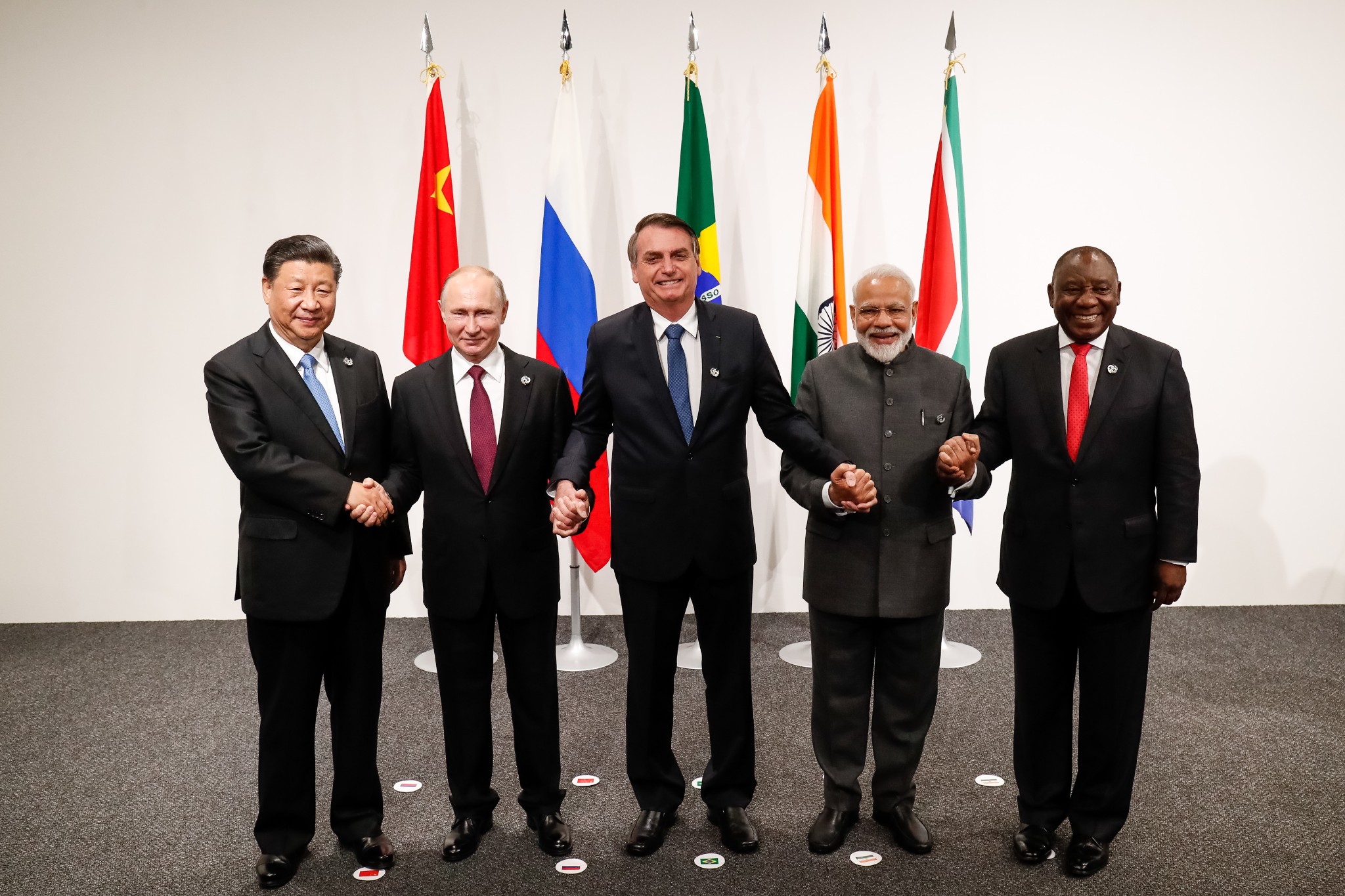 The current leaders of the BRICS nations. From left to right: Xi Jinping, Vladimir Putin, Jair Bolsonaro, Narendra Modi, and Cyril Ramaphosa.
The current leaders of the BRICS nations. From left to right: Xi Jinping, Vladimir Putin, Jair Bolsonaro, Narendra Modi, and Cyril Ramaphosa.
How the Growing Appeal of BRICS Challenges American Influence Abroad
Russia’s invasion of Ukraine has threatened the liberal world order and disrupted stability in Europe, but these are not the only effects the United States should be worried about. In addition to the obvious challenges to concepts of sovereignty, the war in Ukraine has precipitated the recent strengthening of the BRICS (Brazil, Russia, India, China, and South Africa) group, which could challenge the current Western-led world order if not addressed effectively. If the U.S. wants to secure the future against the growing influence of authoritarian countries like China and Russia, it must acknowledge and offer an attractive alternative to the growing influence of BRICS.
The increased collaboration between the BRICS states should worry the U.S. as the group is an already strong, economically powerful coalition that is looking to expand. Currently, the five countries of BRICS make up 40% of the world’s population, 30% of land coverage, 18% of world trade, and 25% of the global nominal GDP. Moreover, these countries play a large role in the world’s global food supply: Russia is the largest wheat exporter in the world, Brazil is the largest soybean exporter and the third-largest corn exporter, and India is the largest rice exporter. Similarly, Russia, India, and China’s influences on the global energy market are significant, as Russia is the largest oil exporter and second-largest natural gas exporter, and India and China play a substantial role in the transition to clean energy. Furthermore, China and Russia have expressed a large interest in expanding the coalition further. Specifically, China recently invited Saudi Arabia, Argentina, Kazakhstan, Egypt, UAE, Indonesia, Nigeria, Senegal, and Thailand to join the group, and Iran has applied for membership. The possible addition of these countries to BRICS should concern the West as all are significant players in the global economy.
Furthermore, the war in Ukraine and the ensuing sanctions against Russia have pushed the BRICS nations closer together in recent months. As global oil prices have increased to as high as $120 per barrel due to a decreased supply in the market, the incentive for non-western nations to buy Russian oil has also grown as Russian oil hovers around $30-35 per barrel. Consequently, countries such as India and China have dramatically increased their imports of Russian crude oil. For example, in the first six months of 2022, India purchased nearly 60 million barrels of Russian oil, which is up from only 12 million in all of 2021. Additionally, South Africa recently stated that it is considering purchasing Russian oil. Moreover, trade between Russia and the other BRICS nations has increased, according to Russian President Vladimir Putin. Putin claims that trade with China, India, Brazil, and South Africa increased by 38% during the first quarter of 2022. Not only has the war strengthened economic ties between the states, but in some ways it appears to be helping resolve disputes. For example, as China and India tightened their relationships with Russia earlier this year, tensions between the two states on the Himalayan border have declined. As the ties between the BRICS nations deepen in the wake of Russia’s invasion of Ukraine, their influence over developing nations has likewise increased.
Russia and China have used Western sanctions against Russia and the war in Ukraine as an opportunity to increase their influence over the Global South. The two nations have projected BRICS as “a powerful emerging market alternative to the West,” while spreading anti-western disinformation and propaganda throughout Africa. Consequently, more developing states have been less likely to support the U.S. and Europe’s condemnation of Russia, as demonstrated by the Latin and South American, Caribbean, and African countries that abstained from the UN vote condemning Russia’s invasion. Furthermore, countries in the Global South are losing faith in the Western world order, as the U.S. pays less and less attention to developing nations. Meanwhile, BRICS nations, most notably China, have turned their attention to them.
To curb the growing influence of BRICS, the U.S. needs to see the larger, global effects of the war in Ukraine. Many in Europe and the U.S. are focused solely on the impact of the war on themselves, but to protect the liberal world order from authoritarian countries such as Russia and China, the West needs to look beyond itself and see the bigger picture. This means fostering a better understanding of local perceptions about the role the U.S. and Western countries should play in the Global South and altruistically demonstrating the benefits of Western cooperation over the drawbacks of Russian and Chinese influences.
Image from Alan Santos/PR on Flickr via Wikimedia – CC by 2.0





